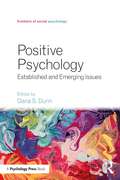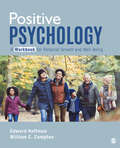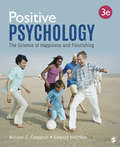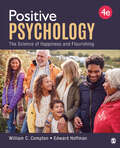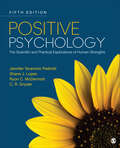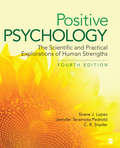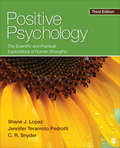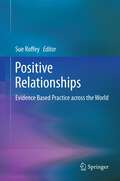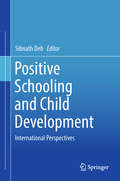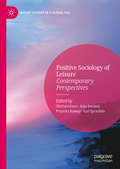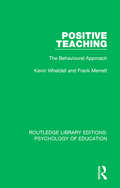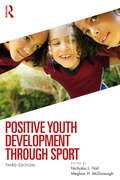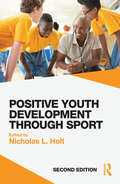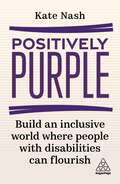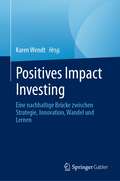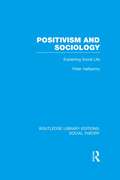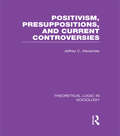- Table View
- List View
Positive Psychology: Established and Emerging Issues (Frontiers of Social Psychology)
by Dana S. DunnThis volume is a comprehensive review of theoretical and empirical contributions to positive psychology. It provides a scientific understanding of how human strengths help people psychologically and physically, showing how stressful circumstances do not inexorably lead to negative prognoses. It examines how individuals confront challenges, appreciate others, and regard daily experiences as meaningful. Many of the chapters also challenge the negative, disease-model approach that dominates much of the research concerning health and well-being. Chapters also address applications and future directions for the field. The broad scope makes it a key resource for undergraduates, graduates, researchers, and practitioners in social, clinical, and positive psychology.
Positive Psychology: The Science Of Happiness And Flourishing
by Dr Edward L. Hoffman Dr William C. ComptonEdward Hoffman and William C. Compton’s Positive Psychology: A Workbook for Personal Growth and Well-Being offers students a wealth of different activities to make concepts in positive psychology come alive. Based on scientific, psychological research that supports learning, activities include self-reflection and interviews with the reader’s family and friends. The workbook can be used with the core text written by the same authors, Positive Psychology: The Science of Happiness and Flourishing, Third Edition, or as a supplement to other core texts.
Positive Psychology: The Science Of Happiness And Flourishing
by Dr Edward L. Hoffman Dr William C. ComptonEdward Hoffman and William C. Compton’s Positive Psychology: A Workbook for Personal Growth and Well-Being offers students a wealth of different activities to make concepts in positive psychology come alive. Based on scientific, psychological research that supports learning, activities include self-reflection and interviews with the reader’s family and friends. The workbook can be used with the core text written by the same authors, Positive Psychology: The Science of Happiness and Flourishing, Third Edition, or as a supplement to other core texts.
Positive Psychology: The Science of Happiness and Flourishing
by Dr Edward L. Hoffman Dr William C. ComptonTopically organized, Positive Psychology: The Science of Happiness and Flourishing presents a highly engaging, up-to-date introduction to positive psychology. Authors William C. Compton and Edward Hoffman invite students to apply practices to their own lives, contexts, and experiences to ensure understanding. The text examines how positive psychology applies to stressors and health within such traditional research areas as developmental, clinical, personality, motivational, social, and behavioral psychology. Furthermore, the text offers perspectives on positive emotional states, research and theory on positive traits, coverage of positive institutions, and a look at the future of positive psychology. The Third Edition reflects significant growth in field with hundreds of new references and expanded content on topics including mindfulness, money and subjective well-being, and romantic love.
Positive Psychology: The Science of Happiness and Flourishing
by Dr Edward L. Hoffman Dr William C. ComptonTopically organized, Positive Psychology: The Science of Happiness and Flourishing presents a highly engaging, up-to-date introduction to positive psychology. Authors William C. Compton and Edward Hoffman invite students to apply practices to their own lives, contexts, and experiences to ensure understanding. The text examines how positive psychology applies to stressors and health within such traditional research areas as developmental, clinical, personality, motivational, social, and behavioral psychology. Furthermore, the text offers perspectives on positive emotional states, research and theory on positive traits, coverage of positive institutions, and a look at the future of positive psychology. The Third Edition reflects significant growth in field with hundreds of new references and expanded content on topics including mindfulness, money and subjective well-being, and romantic love.
Positive Psychology: The Science of Happiness and Flourishing
by William C. Compton Edward L. HoffmanPositive Psychology: The Science of Happiness and Flourishing offers students an up-to-date and contemporary introduction to the field of positive psychology. Topically organized, authors William C. Compton and Edward Hoffman examine how Positive Psychology relates to stressors and health, within such traditional research areas as developmental, clinical, personality, motivational, social, and behavioral psychology. Updates to the Fourth Edition include new material on the spread of positive psychology around the world and expanded coverage on character strengths, emotional intelligence, leisure, and the biology of positive emotions. Included with this title: LMS Cartridge: Import this title’s instructor resources into your school’s learning management system (LMS) and save time. Don’t use an LMS? You can still access all of the same online resources for this title via the password-protected Instructor Resource Site. Learn more.
Positive Psychology: The Science of Happiness and Flourishing
by William C. Compton Edward L. HoffmanPositive Psychology: The Science of Happiness and Flourishing offers students an up-to-date and contemporary introduction to the field of positive psychology. Topically organized, authors William C. Compton and Edward Hoffman examine how Positive Psychology relates to stressors and health, within such traditional research areas as developmental, clinical, personality, motivational, social, and behavioral psychology. Updates to the Fourth Edition include new material on the spread of positive psychology around the world and expanded coverage on character strengths, emotional intelligence, leisure, and the biology of positive emotions. Included with this title: LMS Cartridge: Import this title’s instructor resources into your school’s learning management system (LMS) and save time. Don’t use an LMS? You can still access all of the same online resources for this title via the password-protected Instructor Resource Site. Learn more.
Positive Psychology: The Scientific and Practical Explorations of Human Strengths
by Shane J. Lopez Charles Richard Snyder Jennifer Teramoto Pedrotti Ryon C. McDermottPositive Psychology: The Scientific and Practical Explorations of Human Strengths offers comprehensive coverage of the science and application of positive emotions and human strengths such as empathy, altruism, gratitude, attachment, and love. Authors Jennifer Teramoto Pedrotti, Shane J. Lopez, Ryon C. McDermott, and C. R. Snyder bring positive psychology to life for students by showing how it can improve all phases of contemporary life. The fully revised Fifth Edition explores new examples and reflections on current events, new and emerging scholarship in the field, expanded coverage of the neurological and biological foundations of positive psychology, and a new focus on the diverse aspects of our society and the many strengths rooted in our multi-faceted cultures. Included with this title: LMS Cartridge: Import this title’s instructor resources into your school’s learning management system (LMS) and save time. Don’t use an LMS? You can still access all of the same online resources for this title via the password-protected Instructor Resource Site. Learn more.
Positive Psychology: The Scientific and Practical Explorations of Human Strengths
by Shane J. Lopez Charles Richard Snyder Jennifer Teramoto Pedrotti Ryon C. McDermottPositive Psychology: The Scientific and Practical Explorations of Human Strengths offers comprehensive coverage of the science and application of positive emotions and human strengths such as empathy, altruism, gratitude, attachment, and love. Authors Jennifer Teramoto Pedrotti, Shane J. Lopez, Ryon C. McDermott, and C. R. Snyder bring positive psychology to life for students by showing how it can improve all phases of contemporary life. The fully revised Fifth Edition explores new examples and reflections on current events, new and emerging scholarship in the field, expanded coverage of the neurological and biological foundations of positive psychology, and a new focus on the diverse aspects of our society and the many strengths rooted in our multi-faceted cultures. Included with this title: LMS Cartridge: Import this title’s instructor resources into your school’s learning management system (LMS) and save time. Don’t use an LMS? You can still access all of the same online resources for this title via the password-protected Instructor Resource Site. Learn more.
Positive Psychology: The Scientific and Practical Explorations of Human Strengths (Praeger Perspectives Ser. #7)
by Jennifer Teramoto Pedrotti Dr Shane J. Lopez Charles Richard SnyderPositive Psychology: The Scientific and Practical Explorations of Human Strengths comprehensively covers the science and application of positive psychology. Authors Shane J. Lopez, Jennifer Teramoto Pedrotti, and C. R. Snyder bring positive psychology to life by illustrating issues such as how psychological strength can help increase positive outcomes in school and the workplace and promote cooperative relationships among people. Furthermore, the book encourages readers to engage with concepts in order to understand positive emotions and strengths, such as empathy, altruism, gratitude, attachment, and love. Over 50 case studies grounded in practice, research, and the authors’ teaching experience reveal how positive psychological phenomena operate in the lives of real people.
Positive Psychology: The Scientific and Practical Explorations of Human Strengths (Praeger Perspectives Ser. #7)
by Jennifer Teramoto Pedrotti Dr Shane J. Lopez Charles Richard SnyderPositive Psychology: The Scientific and Practical Explorations of Human Strengths comprehensively covers the science and application of positive psychology. Authors Shane J. Lopez, Jennifer Teramoto Pedrotti, and C. R. Snyder bring positive psychology to life by illustrating issues such as how psychological strength can help increase positive outcomes in school and the workplace and promote cooperative relationships among people. Furthermore, the book encourages readers to engage with concepts in order to understand positive emotions and strengths, such as empathy, altruism, gratitude, attachment, and love. Over 50 case studies grounded in practice, research, and the authors’ teaching experience reveal how positive psychological phenomena operate in the lives of real people.
Positive Psychology: The Scientific and Practical Explorations of Human Strengths (Praeger Perspectives Ser.)
by Jennifer Teramoto Pedrotti Dr Shane J. Lopez Charles Richard SnyderThe fully updated Third Edition of Positive Psychology: The Scientific and Practical Explorations of Human Strengths covers the science and application of positive psychology and presents new frameworks for understanding positive emotions and strengths through a culturally competent lens. Authors Shane J. Lopez, Jennifer Teramoto Pedrotti, and C.R. Snyder bring positive psychology to life by addressing important issues such as how positive psychology can improve schooling and the workplace, as well as how it can promote flourishing in day-to-day life. Throughout the book, well-crafted exercises allow readers to apply major principles to their own lives. The book also explores various positive conditions within multiple cultural contexts, such as happiness and well-being, and processes related to mindfulness, wisdom, courage, and spirituality. “The emphasis is not exclusively clinical; it includes applications and implications across a number of environments and draws from a number of perspectives, including neurobiology. This range makes it an excellent choice for anchoring major concepts so students can explore the application of positive psychology to their specific areas of interest.” —Dr. Pamela Rutledge, Massachusetts School of Professional Psychology
Positive Psychology: The Scientific and Practical Explorations of Human Strengths (Praeger Perspectives Ser.)
by Jennifer Teramoto Pedrotti Dr Shane J. Lopez Charles Richard SnyderThe fully updated Third Edition of Positive Psychology: The Scientific and Practical Explorations of Human Strengths covers the science and application of positive psychology and presents new frameworks for understanding positive emotions and strengths through a culturally competent lens. Authors Shane J. Lopez, Jennifer Teramoto Pedrotti, and C.R. Snyder bring positive psychology to life by addressing important issues such as how positive psychology can improve schooling and the workplace, as well as how it can promote flourishing in day-to-day life. Throughout the book, well-crafted exercises allow readers to apply major principles to their own lives. The book also explores various positive conditions within multiple cultural contexts, such as happiness and well-being, and processes related to mindfulness, wisdom, courage, and spirituality. “The emphasis is not exclusively clinical; it includes applications and implications across a number of environments and draws from a number of perspectives, including neurobiology. This range makes it an excellent choice for anchoring major concepts so students can explore the application of positive psychology to their specific areas of interest.” —Dr. Pamela Rutledge, Massachusetts School of Professional Psychology
Positive Relationships
by Sue RoffeyRelationships are at the heart of our lives; at home with our families, with our friends, in schools and colleges, with colleagues at the workplace and in our diverse communities. The quality of these relationships determines our individual well-being, how well we learn, develop and function, our sense of connectedness with others and the health so society. This unique volume brings together authorities from across the world to write about how relationships might be enhanced in all these different areas of our lives. It also explores how to address the challenges involved in establishing and maintaining positive relationships. This evidence-based book, primarily grounded in the science of positive psychology, is valuable for academics, especially psychologists and professionals, working in the field of well-being.
Positive Schooling and Child Development: International Perspectives
by Sibnath DebThis volume discusses the importance of positive schooling in producing responsible and potentially productive adults. Students are generally more motivated to do well and to realize their full potential in schools that have a positive schooling climate, where they feel safe, included and supported. Nevertheless, the reality in today's schools is very different. This volume discusses the major challenges faced by children and adolescents in schools, including problems with curricula, safety issues, lack of inclusive policies, non-availability of teachers, ineffective teaching, insensitivity towards students’ issues, improper evaluation methods, harmful disciplinary measures, and so on. Experts in child psychology and education discuss these issues at length in this volume and offer viable solutions for policymakers, school administrators, teachers and parents to make suitable changes and create a positive atmosphere in educational institutions. This volume further discusses the role of various stakeholders---school principals, teachers, counsellors and psychologists---in addressing these challenges. In addition, it raises other, emerging issues which have not been covered in previous volumes on this topic and offers evidence-based suggestions to address them. The intended readership of the volume is researchers and students of psychology, education, sociology, social work and public health, and school teachers, administrators and teacher-trainers.
Positive Sociology of Leisure: Contemporary Perspectives (Leisure Studies in a Global Era)
by Karl Spracklen Anju Beniwal Shintaro Kono Priyanka BawejaThis edited collection explores Positive Sociology of Leisure (PSL) as a subfield relating to leisure studies, sociology of leisure, and sociology of happiness. Defined as an area of research that examines social aspects of leisure life with a focus on the optimal functioning of relationship, group, community, organization, and other social units, PSL differs from more critical forms of sociology in that its starting point is social positives. The contributions draw on a range of diverse disciplinary backgrounds to consider various meanings of leisure across themes such as: ageing; sex, sexuality and family; community, youth, and education; and arts and creativity. Positive Sociology of Leisure will be a key reference within the field of sociology of leisure, as well as an important introductory book for those interested in leisure studies.
Positive Teaching: The Behavioural Approach (Routledge Library Editions: Psychology of Education)
by Kevin Wheldall Frank MerrettProblems of classroom management and control are a recurring concern for many teachers. Disruptive behaviour and inattention hinder effective learning and impose a constant drain upon the teachers’ emotional resources. Continual nagging at children only increases teacher stress: what is needed is an effective alternative set of strategies. Originally published in 1984, Positive Teaching seeks to meets this need by presenting the behavioural approach to teaching in a clear, direct and lucid way. By adopting the behavioural approach, problem behaviour can be minimised, or rapidly nipped in the bud when it does arise. While punishment may be used in an attempt to stop almost any kind of behaviour, only the appropriate use of positive methods applied contingently, immediately and consistently can teach new, more adaptive behaviour. This is a crucial issue in real teaching and is rarely encountered or even discussed in most teacher education programmes. It is the central focus of Positive Teaching. This book is for all teachers, from the beginning student to experienced head teachers; for those teaching in a first school, and for those teaching sixth-formers; for those experiencing difficulties and for those whose authority is already well established. The behavioural approach offers practical support to those who are struggling and a rationale for the effective, positive strategies of the successful. We can all improve our teaching.
Positive Youth Development through Sport
by Nicholas L. Holt Meghan H. McDonoughCutting through the political rhetoric about the power of sport as a tool for social change and personal improvement, this book offers insight into how and why participating in sport can be good for children and young people.Still the only book to focus on the role of sport in positive youth development (PYD), it brings together high-profile contributors from diverse disciplines to critically examine the ways in which sport can be used to promote youth development. Now in a fully updated, revised, and expanded third edition, Positive Youth Development through Sport covers a wider range of disciplines including sport psychology, development psychology, physical education, sport development, and sport sociology. With every chapter asking why, what, so what, and what next, the book introduces the theoretical basis and historical context of PYD, quantitative and qualitative methods for assessing PYD in sport, and the potential of PYD in sport across different ages and abilities. This edition includes brand-new chapters on PYD in schools, in Indigenous populations, and across the lifespan, as well as new material on evaluating PYD programs and new case studies of PYD around the world.This is invaluable reading for all students, researchers, educators, practitioners, programmers, and policy makers with an interest in youth sport.
Positive Youth Development through Sport: second edition (Routledge Studies In Physical Education And Youth Sport Ser.)
by Nicholas L. HoltCutting through the political rhetoric about the power of sport as a tool for social change and personal improvement, this book offers insight into how and why participating in sport can be good for children and young people. As the first text to focus on the role of sport in positive youth development (PYD), it brings together high-profile contributors from diverse disciplines to examine critically the ways in which sport can be used to promote youth development. Now in a fully updated, revised and expanded new edition, Positive Youth Development through Sport covers a wider range of disciplines including sport psychology, development psychology, physical education, sport development and sport sociology. Its three main sections focus on: the theoretical and historical contexts of PYD quantitative and qualitative methods for assessing PYD in sport the potential of PYD in sport across different ages and abilities. With expanded guidance on how to apply positive youth development in practice, this is essential reading for all students, researchers, educators, practitioners and policy makers with an interest in youth sport.
Positively Energizing Leadership: Virtuous Actions and Relationships That Create High Performance
by Kim CameronThis practical guide, the first to show how leaders can achieve extraordinary results through the positive energy generated by virtuous interactions with employees, is written by one of the giants in the study of positive leadership. This book reveals one of the most important but frequently ignored factors that lead to spectacular performance in organizations. Kim Cameron, a true pioneer in the study of positive leadership, offers validated scientific evidence that all individuals are inherently attracted to and flourish in the presence of positive energy, a principle known in biology as heliotropism. Further, he shows that the positive relational energy generated by leaders' virtuous behaviors—such as generosity, compassion, gratitude, trustworthiness, forgiveness, and kindness—is tightly linked to extraordinary organizational outcomes like greater innovation, higher profits, and increased engagement and retention. Cameron has not written a feel-good tome about the power of positive thinking, "happiology," or unbridled optimism. This research-based explanation shows how to achieve performance that exceeds expectations. He provides practical suggestions, assessments, and exercises showing how leaders can improve their own positive energy and increase positive relational energy in their organizations. Positively Energizing Leadership is a major contribution to the theory and practice of leadership.
Positively Purple: Build an Inclusive World Where People with Disabilities Can Flourish
by Kate NashMost employers will have a workforce where at least 10% of their people will have a visible or invisible disability. And 86% of all disabled people acquire their disability during the course of their working lives. How can businesses create strategies and a company culture that includes all staff?Ensure that your company or organization doesn't become guilty of the soft bigotry of low expectations when it comes to disabled employees and customers. Learn from your disabled staff and consumers and be equipped to be a better and more dynamic organization.Kate Nash, founder of #PURPLELIGHTUP - a global movement which celebrates the economic contribution of employees with disability - will help you understand how any organization can ensure disabled staff and consumers are included and valued. Telling a fascinating story of how to make change happen and recognizing that any kind of transformation requires knowledge, determination and hard yards of campaigning, networking and deal making, you will learn how to build disability confidence throughout your organization.Positively Purple allows disabled workers to claim their rightful place centre stage as just another valuable member of the team.
Positives Altern und Prekarität: Theorie, Politik und soziale Realität im vergleichenden deutschen Kontext
by Irina Catrinel CrăciunDieses Buch untersucht positives Altern aus der Perspektive der Prekarität und zielt darauf ab, Theorien des positiven Alterns in aktuellen sozialen Kontexten zu verankern. In den letzten Jahren war die Forschung zum Thema Altern von wachsenden Meinungsverschiedenheiten zwischen Befürwortern des Modells des erfolgreichen Alterns und kritischen Gerontologen geprägt, die auf die zunehmenden Ungleichheiten, Benachteiligungen und die Prekarität hinweisen, die das Alter charakterisieren. Dieses Buch schließt eine Wissenslücke, indem es eine alternative Sichtweise auf positives Altern bietet, die durch Prekarität und deren Auswirkungen auf Projektionen zum Thema Altern informiert ist. Der erste Teil des Buches stellt das Altern in einen breiteren theoretischen und empirischen Kontext und untersucht die komplexen Zusammenhänge zwischen Ansichten über das Altern, Theorien des erfolgreichen Alterns, Politik und sozialer Realität. Der zweite Teil nutzt Ergebnisse einer qualitativen Forschung, die in Deutschland durchgeführt wurde, um die Diskrepanz zwischen den Idealen des erfolgreichen Alterns und sowohl negativen als auch positiven Ansichten über das Altern sowie Vorbereitungsstrategien auf das Altern, die durch Prekarität inspiriert sind, zu veranschaulichen. Die Ergebnisse dieses Abschnitts bieten einen soliden Ausgangspunkt für Vergleiche mit Ländern, die hinsichtlich der Wohlfahrtsregime und der Alternspolitiken sowohl Ähnlichkeiten als auch Unterschiede zu Deutschland aufweisen. Der abschließende Teil des Buches erörtert die psychologischen Implikationen dieser Ergebnisse innerhalb und außerhalb der deutschen Fallstudie und skizziert mögliche Lösungen für die Praxis. Dieses Buch bietet Gesundheitspsychologen, Gerontologen, Soziologen, Sozialarbeitern, Gesundheitsfachkräften sowie Studierenden und den älteren Menschen selbst ein besseres Verständnis für die Bedeutung des Alterns in prekären Zeiten und stärkt das Vertrauen, trotz Prekarität gut zu altern.
Positives Impact Investing: Eine nachhaltige Brücke zwischen Strategie, Innovation, Wandel und Lernen
by Karen WendtDieses Buch veranschaulicht die Auswirkungen, die eine Konzentration auf ökologische und soziale Themen sowohl auf die Risikominderung von Anlagen als auch auf die Förderung von Innovationen hat. Die Einbeziehung der Auswirkungen als neuer Eckpfeiler des Anlagedreiecks erfordert, dass Investoren und Kunden ihre Interessen und Werte aufeinander abstimmen und die Bedürfnisse verstehen. Dieser Abstimmungsprozess fungiert als Katalysator für die Veränderung der Organisationskultur innerhalb einer Organisation und initiiert somit die externe Wirkung der Organisation, aber auch ihre interne Veränderung, die wiederum die Schaffung von Wirkung verstärkt. Das Buch beschreibt, wie Kultur der soziale Klebstoff ist, der alle Disziplinen einer Organisation durchdringt, und zeigt auf, wie eine organisatorische Ausrichtung erreicht werden kann, um strategische Schnelligkeit, Innovation und Lernen zu ermöglichen, und liefert Beispiele dafür, wie Wirkung erzielt und Mitarbeiter mobilisiert werden können. Es konzentriert sich insbesondere auf Impact Investing, Impact Entrepreneurship, Innovation, De-Risking-Asset, grüne Investitionslösungen und Investorenbewegungen, um dem Klimawandel entgegenzuwirken und die Ziele für nachhaltige Entwicklung der Vereinten Nationen umzusetzen, und beleuchtet dabei Kultur, Kommunikation und Strategie.
Positivism and Sociology: Explaining Social Life (Routledge Library Editions: Social Theory #Vol. 13)
by Peter HalfpennyAny serious attempt to explain social life has to come to terms with sociology's positivist legacy. It is a heritage on the one hand from the seventeenth-century political arithmeticians and the later moral statisticians who believed that quantification would provide the basis for a dispassionate analysis of social affairs; and on the other hand from the nineteenth-century post-Enlightenment social philosophers who were eager to develop an empirical science of society that would enable them to control social conduct – just as the physical sciences had provided the knowledge to tame nature. Yet every debate about the relation between positivism and sociology is clouded by the diversity of uses of the term 'positivism' – uses that are so varied that some can pronounce positivism dead while others find it still the vital force that dominates sociology. The particular merit of Peter Halfpenny's book is that it makes this diversity of uses its central theme. In order to provide a clear basis from which to assess controversial questions about the contribution of the positivist traditions to sociology, the book reviews twelve different important uses of the term 'positivism' that have emerged at different times since the mid-nineteenth century, when Auguste Comte coined both 'positivism' and 'sociology'. This review is conducted by examining the historical development of the two independent roots of modern sociological positivism – positivist philosophy and statistics – and by analysing logical positivist philosophy, which in many ways defined the course of twentieth century philosophy of the social (as well as the natural) sciences.
Positivism, Presupposition and Current Controversies (Theoretical Logic in Sociology)
by Jeffrey C. AlexanderThis volume begins by challenging the bases of the recent scientization of sociology. Then it challenges some of the ambitious claims of recent theoretical debate. The author not only reinterprets the most important classical and modern sociological theories but extracts from the debates the elements of a more satisfactory, inclusive approach to these general theoretical points.
